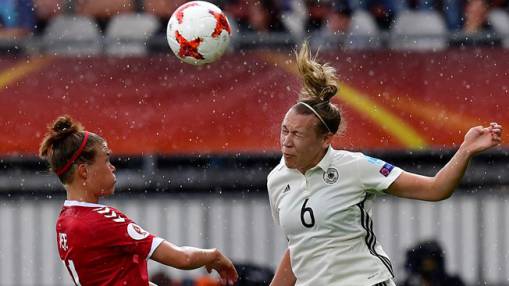Eight European teams will join hosts France at the 2019 Women’s World Cup Faroe Islands-Czech Republic kicks off group stage on 14 September Continental powerhouses England and Germany will now enter the race
The beginning of a FIFA Women’s World Cupâ„¢ qualifying campaign is generally a time of great optimism for all teams in the starting blocks, from so-called minnows like Albania, the Faroe Islands and Moldova, who are all dreaming of a maiden qualification, to elite teams such as Germany, England, Spain and Sweden, whose aims are rather higher.
And although the first two rounds of European qualifying matches – which will take place between 14 and 19 September – will inevitably see reality bite for some participating sides, until then everyone has grounds for optimism.
Qualifying process
The five nations that emerged from the preliminary round, which was held between 6 and 11 April, as well as the other 30 competing teams, have been divided up into seven groups of five. The winners of each section will advance to France 2019, while the four second-placed teams with the best records will qualify for the play-offs (semi-finals and final). The team that emerges from the play-off final will become the eighth and final European qualifier, joining hosts France at the prestigious tournament.
Groups
Group A: Bosnia-Herzegovina, England, Kazakhstan, Russia, Wales
Group B: Albania, Belarus, Poland, Scotland, Switzerland
Group C: Ireland, Netherlands, Northern Ireland, Norway, Slovakia
Group D: Croatia, Denmark, Hungary, Sweden, Ukraine
Group E: Czech Republic, Faroe Islands, Germany, Iceland, Slovenia
Group F: Belgium, Italy, Moldova, Portugal, Romania
Group G: Austria, Finland, Israel, Serbia, Spain
Highlights of the first two matchdays
* Faroe Islands-Czech Republic, 14 September, 20.00 (local time)
Given that Germany are likely to run away with things in Group E, the real suspense in the pool may stem from the battle for second place, but this initial fixture also has a certain symbolic value, as it officially signals the beginning of the group stage of the qualifying campaign for France 2019. The Faroes, like Albania, Israel, Kazakhstan and Moldova, all came through a preliminary group phase.
* Germany-Slovenia, 16 September, 14.00 (local time)
In the same section, much attention will be paid to the Germans’ opening match, particularly after the early exit they suffered at the recent UEFA European Women's Championship, a tournament they had previously won six times in a row. Led by Dzsenifer Marozsan, the only German woman nominated for The Best FIFA Women’s Player 2017, the Olympic champions will be keen to show that they are right to be considered as one of the favourites to lift the trophy in France.
* Italy-Moldova, 15 September, 20.30 (local time)
* Romania-Italy, 19 September, 17.00 (local time)
Italy have not graced the Women’s World Cup since 1999, and they were eliminated from the UEFA Women’s EURO 2017 at the group stage. One of the leading women’s national teams of the 1980s, La Nazionale have great hopes of qualifying for and making an impact at France 2019. In an open-looking group, they will need to get off to the best possible start, as Belgium and Portugal will also fancy their chances of claiming top spot.
* England-Russia, 19 September, 20.00 (local time)
There was a time when England’s main ambition was simply to qualify for major tournaments, but that is clearly no longer the case. Having been the best European team at Canada 2015, where they finished third, and having reached the semi-finals of EURO 2017, their sights are now firmly set on securing the global crown. Earning maximum points at home will be crucial during this qualifying campaign; the Russians will need to be on their guard.
* Northern Ireland-Republic of Ireland, 19 September, 20.30 (local time)
In a Group C that contains European champions Netherlands and former world champions Norway, Ireland and Northern Ireland will doubtless be aware that finishing in first place is going to be a tall order. Defeating their closest neighbours, therefore, could provide a much-needed morale boost prior to the challenges that lie ahead.
Source: fifa.com
